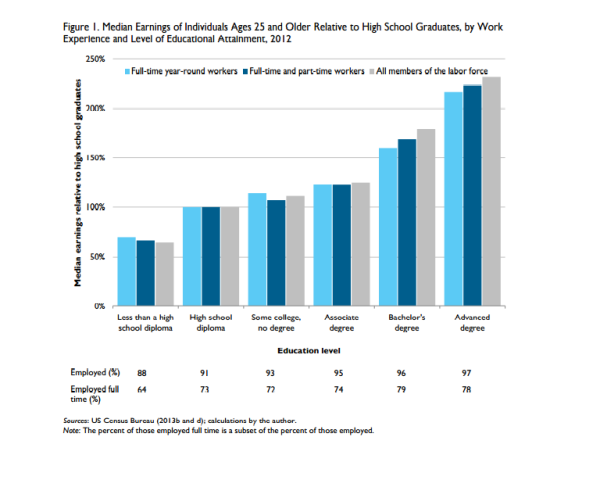Study Shows College Still Pays Off
A February 2014 study titled ‘Higher Education Earnings Premium’ by the Urban Institute’s Sandy Baum suggests that even in today’s changing economy, any amount or type of postsecondary education pays off for students.
We live in a day when, due to a growing paranoia about the lack of jobs for recent grads, media outlets seem to tell the horror stories and little else. However, examining only immediate investment-return (one, two years after graduation) would be to neglect the many benefits that a college education has to offer—especially considering the growing gap between high school and college graduates in terms of employment and pay. (Baum previously stressed the role of time in the increasing value of a degree in an NPR article from August 2013.)
The study first attempts to define college and purposely fails. The fact is, today’s definitions are changing. And yet, in comparison to students with only a high school degree or GED, the average person who pursues any type of postsecondary schooling—some college with no degree, an associate’s, a bachelor’s or an advanced degree—has a better chance of working full time and receiving higher pay. Baum uses five studies (and their corresponding graphs) to examine employment immediately after college, employment after the age of 25, earnings premium over time since 1972, median earnings from 2000-2012, and median earnings for bachelor’s degree recipients by state. Each chart also distinguishes between type of degree, type of employment, age, and gender.
 Photo by the Urban Institute
Photo by the Urban Institute
To cite one example, in 1992 median earnings of men and women ages 25-34 with a bachelor’s degree or more working full time were both under 60 percent higher than median earnings of those with only a high school degree. In 2012, however, the numbers were at 70 and 82 percent, respectively—proving that the gap between high school and college graduates is widening in terms of pay and whether they are part-time employees, full-time employees, or unemployed.
In addition, since earnings within the four-year degree category vary greatly, Baum found that basing any assumption about the benefits of traditional education on one person or job is insufficient. For example, 18 percent of full-time workers whose highest degree is a bachelor’s (in this study) consist of four major job types. Two of them—school teachers and miscellaneous managers—made around $44,000 a year and $82,000 a year on average in 2011, respectively. So do a teacher’s earnings—especially considering his or her contribution to society—make college less beneficial?
Most of the research surrounding the benefits of postsecondary education is measured monetarily, but Baum suggests that a significant portion of their benefits is nonmonetary, including an output of school teachers, the opportunity for advancement in graduate programs and higher, and even health and civic engagement.
So considering that there are many—and many types—of benefits for getting some sort of post-high school degree, why aren’t more people doing it? According to the study, the answer is three-fold. Financial barriers, environments with little or no expectation of educational advancement, and an inability to receive help with complex processes all may stifle a student’s progress (Brand and Xie 2010).
Baum finishes, “College pays off well for most people. And the payoff for those on the fence—the marginal students who might be induced to enroll by policy changes including the availability of better information and more generous funding—is likely to be high” (Baum 9-10). That is where we step in. A Jack Kent Cooke scholarship can, first of all, eliminate those financial barriers. In addition, our students—many of whom begin working with our advisers when selected for the Young Scholars Program in grade eight—will enjoy guidance on where to apply and where to seek additional financial aid. When a student has been accepted into our College Scholarship Program his or her senior year of high school, an adviser not only helps him or her navigate choosing a college, regular check-ins with the adviser when in college make sure the Scholar thrives in his or her new environment. By removing the non-educational obstacles, we hope that each student can focus on school, on what they do best.
Applications for the Young Scholars Program are due March 20, 2014. Applicants should plan to start the 8th grade this fall. The window is open from September to November for the College Scholarship Program. High school seniors are invited to apply to this program.